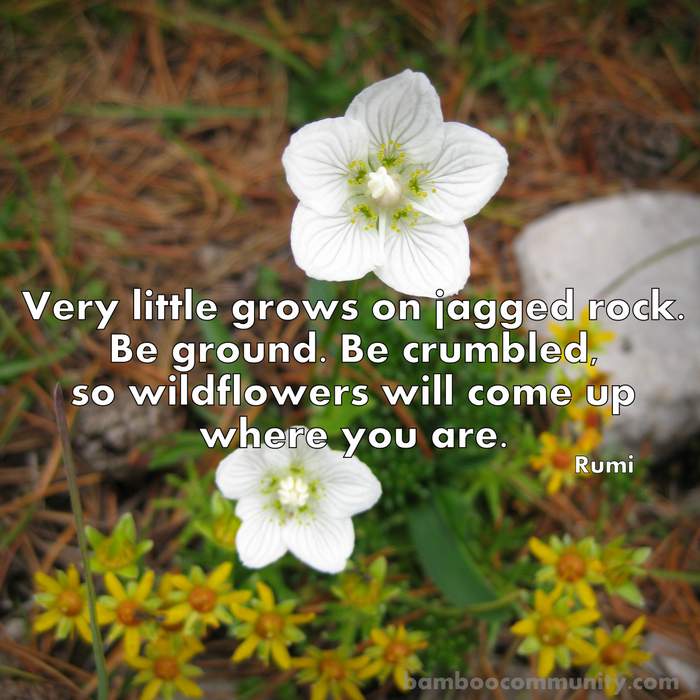
BRONWYN | VESANCY (FR)
In my garden a mature bamboo thrives under the force of whatever weather. I live in France and, over the last seven years, I've watched the bamboo bend and move according to the fall of hail, sun, rain, wind and snow. At the moment it is under massive snow. It's cold and we can walk from home into the forest to play in the fields of white. The children slide over snow and it's gentle, challenging terrain. Here we find a kind of delight that seems transcendent but bound to the stuff that covers the ground. Other days the snow seems difficult, cold and demanding and we hide inside from its extremes. I want to be warm and cosy and it won't let me. Dragging wood into the house to make a fire is heavy, dirty work. It takes a lot of effort to leave home, go to the shops or even walk along my street to collect the kids from school. The bamboo plant seems resilient in the face of this extreme weather.
I live fifteen minutes from Geneva so cannot escape stories from the international coalface where the world's violence is acute and affects many friends who work with the United Nations. Syria, Southern Sudan, the Philippines and Bangladesh become part of the fabric of our comfortable life. Sometimes it's hard to be hopeful when the news stories become real within the skin of loved ones who work and live in these places. The trauma of the world is difficult to push away. Sadness can overwhelm hope. The world can be a dangerous place and when many others face life and death difficulties I've failed in my capacity to navigate its simplest demands: like dealing with difficulties of snow. Justice for the earth and for each other seems impossible. At these times I try to remember a quote from Leonard Cohen.
"What is a saint? A saint is someone who has achieved a remote human possibility. It is impossible to say what that possibility is. I think it has something to do with the energy of love. Contact with this energy results in the exercise of a kind of balance in the chaos of existence. A saint does not dissolve the chaos; if he did the world would have changed long ago. I do not think that a saint dissolves the chaos even for himself, for there is something arrogant and warlike in the notion of a man setting the universe in order. It is a kind of balance that is his glory. He rides the drifts like an escaped ski. His course is a caress of the hill. His track is a drawing of the snow in a moment of its particular arrangement with wind and rock. Something in him so loves the world that he gives himself to the laws of gravity and chance. Far from flying with the angels, he traces with the fidelity of a seismograph needle the state of the solid bloody landscape."
Like Cohen says, balance is vital and reading the truth of this world, its rocks, winds and snow drifts, and accessing its energy is the most humble method of reaching towards a possibility of a just future. Bamboo is a plant that thrives in the sweltering tropics and outside my northern window it is strong enough to cope with the weight of snow. Bamboo is many places and spaces where all are welcome to explore the desire to love the world with its injustice, difficulties, hope and possibilities.
While the saint is commonly perceived as someone who loves the people around them, we are now being asked by politics, ethics and the environment to also turn towards a forgotten second law: to love the world in all its seasons even when they are, in the age of climate change, aberrant and violent, hot and freezing. Within Bamboo appears a nurturing of discernment and contemplation that appeals to the possibility of balance and love not only for each other, but also for the earth and the injustices we put upon it. Bamboo, a plant with strong roots and incredible flexibility, allows us to reflect together as humans nurtured both by earth and community, as well as to find nourishment for participation, engagement and action in a project bigger than ourselves. While there is so much to mourn about this world and its trajectory, hope and nourishment can be equivalent and I wish to be part of Bamboo in order to affirm this claim towards being together with the desire to love the world. This desire might seem childish, but it won't leave. Across all times, traditions and places this desire for love wonderfully haunts human existence. In speedy times, there's not much space to reflect together but Bamboo allows this possibility, so I'm happy to be part of such connections in their different forms. In our village with my partner, a wonderful skier, and a few friends we will start a small Bamboo group and don't know where this will lead. As far as I understand it Bamboo is not about setting the universe in order, but rather about connecting with the energy of love in the simplest of ways. This might mean a chat over a cup of tea, an internet exchange or a shared moment of quiet contemplation. These are all actions we'll work out together as we navigate our shared landscape of difficulties and hopes.
For now, as I write, the children are asleep, the news is offline and the snow is melting. It will return and the bamboo in my garden will once again be covered by its beauty and difficulty. I want to be part of its adventure.

Bronwyn Lay
Bronwyn is a lawyer and writer currently completing a PhD in the history and philosophy of law. She lives near Geneva in France with her family.
